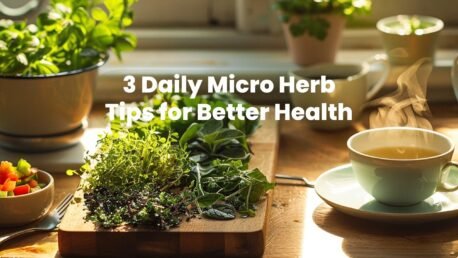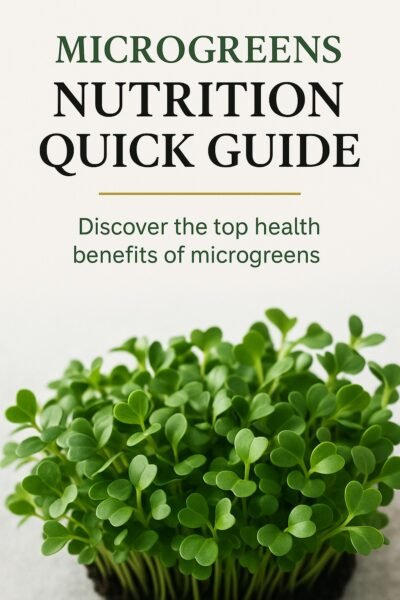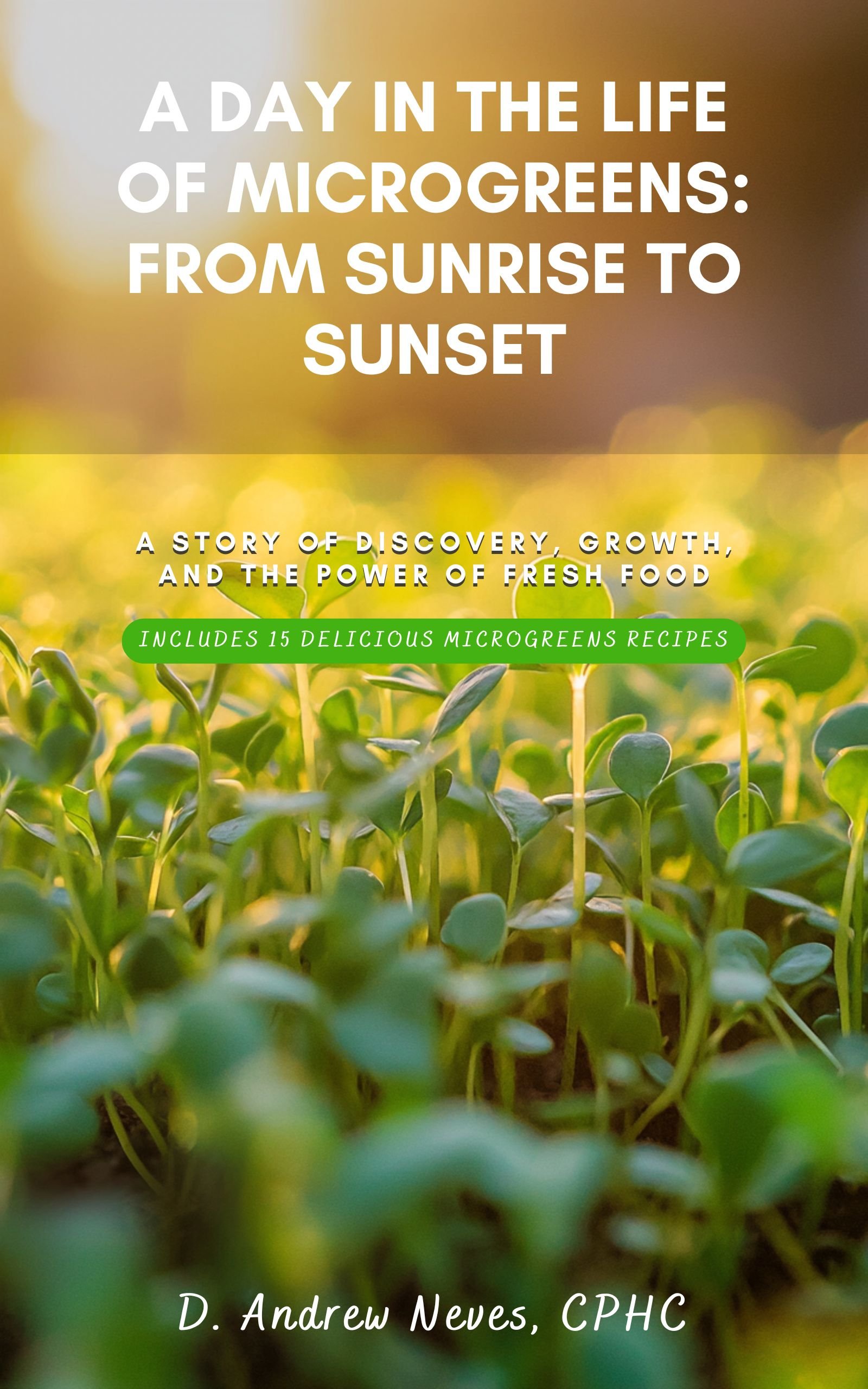You’re drowning in mental work, your energy depleted, and your focus scattered. But what if there was a way out? A path to reclaim your vitality, sharpen your mind, and fortify your health. Intrigued?
Let me share a secret with you.
You see, you’ve just discovered three daily health boosts that can transform your life. And they can do the same for you. Are you ready to unlock your full potential and experience the health benefits of consuming micro herbs daily?
You can boost your daily health with nutrient-packed micro herbs. You’ll boost energy levels by incorporating basil, cilantro, parsley, and fenugreek into your diet; they support your metabolism and provide essential vitamins.
You’ll improve mental clarity and focus with rosemary, peppermint, lemon balm, thyme, and sage, which also reduce oxidative stress in your body.
You’ll strengthen your immune system using micro herbs like cilantro, basil, parsley, fenugreek, and amaranth, rich in antioxidants and essential nutrients. These micro herbs offer you a natural way to enhance your overall well-being, with benefits spanning from increased energy to improved immune function and mental acuity.
So, are you ready to revolutionize your health?
To reclaim your energy, sharpen your focus, and bolster your defenses? The power is in your hands. Will you seize it?
Key Takeaways
- Micro herbs like basil, cilantro, and parsley boost energy with essential nutrients and vitamins.
- Chia micro herbs stabilize blood sugar levels for sustained energy and enhance focus.
- Rosemary, peppermint, and thyme improve mental clarity and cognitive function.
- Cilantro, basil, and fenugreek support immune function with vitamins and antioxidants.
- Amaranth aids immune response, heart health, and digestion and provides sustained energy.
INTERESTED IN MICROGREENS?
Join the community
Join more than 100,000 other health-conscious individuals and couples who visit our site and receive weekly emails from us to help them grow more microgreens to live healthier and longer lives.
The Seeker’s Three Health Elixirs
The Energy Enhancer
The Clarity Composer
The Immunity Ignitor
Basil (Ocimum basilicum)
Cilantro (Coriandrum sativum)
Parsley (Petroselinum crispum)
Fenugreek (Trigonella foenum-graecum)
Chia (Salvia hispanica)
Summary
References
Improved Mental Clarity and Focus
Rosemary (Rosmarinus officinalis)
Peppermint (Mentha piperita)
Lemon Balm (Melissa officinalis)
Thyme (Thymus vulgaris)
Sage (Salvia officinalis)
Summary
References
Cilantro (Coriandrum sativum)
Basil (Ocimum basilicum)
Parsley (Petroselinum crispum)
Fenugreek (Trigonella foenum-graecum)
Amaranth (Amaranthus spp.)
Summary
References
Can These Micro Herbs Be Used in Cooking for Added Health Benefits?
Are There Any Potential Side Effects or Interactions With Medications?
How Can These Micro Herbs Be Incorporated Into a Daily Routine?
Are There Ways to Grow These Herbs at Home for Easy Access?
Can These Micro Herbs Be Used in Combination With Other Supplements for Enhanced Effects?

An affirmation of mine is acknowledging the immense energy and formidable focus that my daily thinking, creating, and writing demands.
And coupled with that realization comes the understanding that wholesome nutrition is vital fuel for this taxing journey. I continually search for simple yet potent ways to brighten my health’s spectrum each day.
These are the three health elixirs I diligently take in daily.
The Energy Enhancer
We all crave it, don’t we?
Imagine bounding out of bed, tackling tasks with gusto. It’s not a pipe dream. The key? A trifecta of balanced nutrition, regular exercise, and quality sleep. Simple, yet powerful.
But here’s the kicker – it’s all about consistency.
The Clarity Composer
Ever feel like your brain’s stuck in a fog?
I’ve been there. But no more. The secret weapon? Omega-3 rich foods and mindfulness practices. Picture your mind as a finely tuned instrument, ready to compose symphonies of productivity.
Sounds good, doesn’t it?
The Immunity Ignitor
In these uncertain times, a robust immune system is your best friend. How do you nurture this friendship? With a colorful plate of vitamin-rich foods and stress-busting techniques. Imagine sailing through flu season unscathed.
Tempting, isn’t it?
But wait, there’s more. Have you heard about micro herbs?
Let me introduce to you some of these scientifically vetted hidden gems to pump up energy, polish mental clarity, heighten focus, and stoke the coals of immunity.
They pack a punch in the health department. Basil, cilantro, parsley – they’re not just garnishes. They’re your ticket to vitality.
These micro herbs can be cherished additions to your micro herb garden.
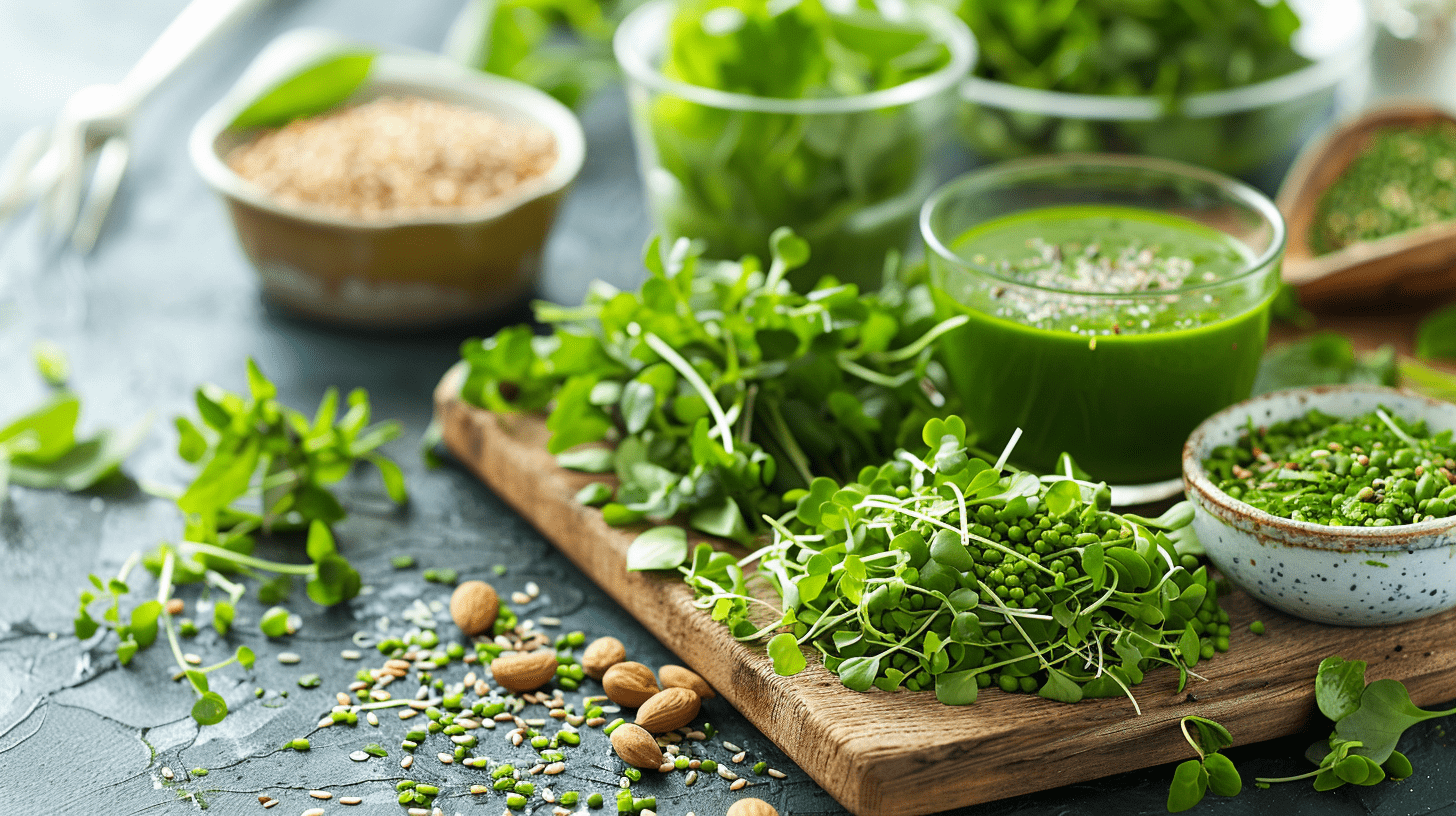
When looking to boost your energy levels, consider nutrient-dense micro herbs like basil, cilantro, parsley, fenugreek, and chia.
These herbs contain crucial vitamins, minerals, and antioxidants that can support metabolic functions, aid in detoxification, and promote sustained energy throughout the day.
Basil (Ocimum basilicum)
For generations, basil has been esteemed in folk medicine as a powerful herb. It contains a rich blend of antioxidants, inflammation-fighting substances, and aromatic oils that contribute to its diverse therapeutic properties.
How It Helps
- Contains: Essential oils like eugenol, and vitamins A and K.
- Benefits: Basil has adaptogenic properties, helping the body adapt to stress and promote mental clarity, which can enhance overall energy levels.
Scientific Evidence:
Study: The study published in Evidence-Based Complementary and Alternative Medicine provides scientific evidence supporting the significant anti-stress effects of basil, indirectly boosting energy levels by reducing fatigue associated with stress (Jamshidi et al., 2017).
Cilantro (Coriandrum sativum)
The herb cilantro, which also goes by the name coriander, is a multipurpose plant that may enhance vitality. Its significant iron concentration can improve the blood’s ability to carry oxygen, potentially leading to increased energy.
How It Helps
- Contains: High levels of antioxidants, essential vitamins like vitamin C, and iron.
- Benefits: Cilantro’s high iron content can help improve oxygen transport in the blood, enhancing energy levels.
Scientific Evidence
Study: A study featured in the journal Molecules sheds light on cilantro’s ability to combat free radicals. This research suggests the herb may help mitigate cellular damage and potentially boost overall vigor (Mahleyuddin et al., 2022).
Parsley (Petroselinum crispum)
The herb parsley contains abundant vitamins A, C, and K, along with folate and iron. These nutrients can boost vitality by supporting the body’s cleansing processes and promoting the formation of oxygen-carrying blood cells.
How It Helps
- Contains: Vitamins A, C, and K, folate, and iron.
- Benefits: Parsley can aid in detoxification and support red blood cell production due to its high iron and folate content, leading to increased energy.
Scientific Evidence
A study published in Molecules has shown that parsley’s nutrient profile contributes to metabolic functions and detoxification processes, ultimately leading to heightened energy levels (Es-safi et al., 2009).
Fenugreek (Trigonella foenum-graecum)
Fenugreek is a powerful herb that can increase your energy levels due to its rich content of saponins, fiber, vitamins, and minerals.
How It Helps
- Contains: Saponins, fiber, and various vitamins and minerals.
- Benefits: Fenugreek has a reputation for helping maintain balanced glucose in the bloodstream and enhancing digestive function. These properties may contribute to a more consistent and enduring sense of vitality throughout the day.
Scientific Evidence
Study: Research published in the Journal of Personalized Medicine indicates that consuming fenugreek as a dietary supplement may aid in regulating blood sugar. The study found that participants experienced heightened vigor and decreased exhaustion, suggesting fenugreek’s potential to enhance overall energy (Albaker, 2023).
Chia (Salvia hispanica)
Chia microherbs contain omega-3 fatty acids, protein, fiber, and antioxidants, which contribute to a steady release of energy by stabilizing blood sugar levels.
How It Helps
- Contains: Omega-3 fatty acids, protein, fiber, and antioxidants.
- Benefits: Chia micro herbs provide a steady release of energy due to their high protein and fiber content, stabilizing blood sugar levels.
Scientific Evidence
In a study published in the Unnes Journal of Public Health, chia demonstrated the potential to improve exercise performance for workouts lasting 90 minutes or more. This indicates their ability to boost energy levels (Lestari et al., 2024).
Summary
Incorporating these micro herbs into your diet can offer significant energy-boosting benefits. Each herb provides a unique blend of nutrients and bioactive compounds that support various physiological functions essential for maintaining high energy levels.
References
Lestari, Y., Farida, E., Candra, A. R., Amin, N., & Fauzi, N. (2024). The Changes in Hydration Status and Blood Glucose Levels of Young Football Athletes Who Were Given Chia Seeds (Salvia hispanica, L.) Based Sports Energy Gel. Unnes Journal of Public Health, 13(1), 86-94. https://journal.unnes.ac.id/sju/ujph/article/view/62739
Jamshidi, N., & Cohen, M. M. (2017). The Clinical Efficacy and Safety of Tulsi in Humans: A Systematic Review of the Literature. Evidence-Based Complementary and Alternative Medicine: ECAM, 2017. https://doi.org/10.1155/2017/9217567
Mahleyuddin, N. N., Moshawih, S., Ming, L. C., Zulkifly, H. H., Kifli, N., Loy, M. J., Sarker, M. M. R., Al-Worafi, Y. M., Goh, B. H., Thuraisingam, S., & Goh, H. P. (2022). Coriandrum sativum L.: A Review on Ethnopharmacology, Phytochemistry, and Cardiovascular Benefits. Molecules, 27(1), 209. https://doi.org/10.3390/molecules27010209
Es-safi, I., Mechchate, H., Amaghnouje, A., Kamaly, O. M. A., Jawhari, F. Z., Imtara, H., Grafov, A., & Bousta, D. (2021). The Potential of Parsley Polyphenols and Their Antioxidant Capacity to Help in the Treatment of Depression and Anxiety: An In Vivo Subacute Study. Molecules, 26(7), 2009. https://doi.org/10.3390/molecules26072009
Albaker, W. I. (2023). Fenugreek and Its Effects on Muscle Performance: A Systematic Review. Journal of Personalized Medicine, 13(3), 427. https://doi.org/10.3390/jpm13030427

To boost mental clarity and focus, incorporating herbs like rosemary, peppermint, lemon balm, thyme, and sage into your diet can be advantageous.
These herbs contain compounds such as carnosic acid, menthol, rosmarinic acid, thymol, and rosmarinic acid that have been scientifically shown to elevate cognitive function and memory.
Rosemary (Rosmarinus officinalis)
Rosemary is a herb celebrated for its cognitive benefits. It contains compounds like carnosic acid and rosmarinic acid that contribute to improved mental clarity and focus.
How It Helps:
- Contains: Carnosic acid, rosmarinic acid, and essential oils.
- Benefits: The herb rosemary is recognized for its capacity to boost recall and mental acuity. It achieves this by promoting increased circulation to cerebral tissues and mitigating cellular damage caused by free radicals.
Scientific Evidence:
Study: A study published in the Journal of Medicinal Food found that rosemary extract significantly improved cognitive performance and mental alertness in elderly subjects (Pengelly, 2012).
Peppermint (Mentha piperita)
Peppermint offers notable benefits for improving mental clarity and focus. The menthol, rosmarinic acid, and essential oils present in peppermint contribute to its ability to boost memory and alertness.
How It Helps:
- Contains: Menthol, rosmarinic acid, and various essential oils.
- Benefits: Peppermint has been shown to improve memory and alertness, likely due to its stimulating properties and ability to enhance oxygen supply to the brain.
Scientific Evidence:
Study: Research in the International Journal of Neuroscience indicated that peppermint aroma can enhance memory and increase alertness (Moss, 2003).
Lemon Balm (Melissa officinalis)
Lemon Balm is an herb known for its ability to improve mood and cognitive function, as well as reduce anxiety, ultimately enhancing calmness and focus.
How It Helps:
- Contains: Rosmarinic acid, caffeic acid, and flavonoids.
- Benefits: Lemon balm has a reputation for elevating spirits and sharpening mental abilities. It’s also associated with decreasing feelings of unease and promoting tranquility, potentially leading to better concentration.
Scientific Evidence:
Study: A study published in Psychosomatic Medicine found that lemon balm improved cognitive performance and calmness in healthy adults (Kennedy et al., 2004).
Thyme (Thymus vulgaris)
Thyme (Thymus vulgaris) is a herb known for its potential to improve mental clarity and focus. Its key components, including thymol, carvacrol, and flavonoids, have been linked to improved neurotransmitter function essential for maintaining cognitive sharpness.
How It Helps:
- Contains: Thymol, carvacrol, and flavonoids.
- Benefits: Thyme has been shown to improve neurotransmitter function, which is crucial for maintaining focus and mental clarity.
Scientific Evidence:
Study: Research in the IEEE Explore demonstrated that thyme oil could enhance cognitive function by increasing acetylcholine levels in the brain (Aminikhanghahi et al., 2017).
Sage (Salvia officinalis)
Sage is well-known for its memory-enhancing properties and its ability to improve attention and cognitive function.
How It Helps:
- Contains: Rosmarinic acid, caffeic acid, and essential oils.
- Benefits: Sage is known for its memory-enhancing properties and ability to improve attention and cognitive function.
Scientific Evidence:
Study: A study in Drugs in R&D confirms that sage and its individual active constituents influence several biological processes that may impact neurological and cognitive function (Lopresti et al., 2016).
Summary
Cultivating these plants as micro herbs can provide an accessible method to boost mental acuity and concentration. The distinct array of active ingredients in each herb contributes to supporting cerebral wellness and thinking processes in its own way.
References
Pengelly, A., Snow, J., Mills, S. Y., Scholey, A., Wesnes, K., & Butler, L. R. (2012). Short-term study on the effects of rosemary on cognitive function in an elderly population. Journal of Medicinal Food, 15(1), 10–17. https://doi.org/10.1089/jmf.2011.0005
Moss, M., Cook, J., Wesnes, K., & Duckett, P. (2003). Aromas of rosemary and lavender essential oils differentially affect cognition and mood in healthy adults. The International Journal of Neuroscience, 113(1), 15–38. https://doi.org/10.1080/00207450390161903
Kennedy, David O., et al. “Attenuation of Laboratory-Induced Stress in Humans After Acute Administration of Melissa Officinalis (Lemon Balm).” Psychosomatic Medicine, vol. 66, no. 4, July 2004, pp. 607–613, https://doi.org/10.1097/01.psy.0000132877.72833.71.
Samaneh Aminikhanghahi, Ramin Fallahzadeh, Sawyer, M., Cook, D. J., & Holder, L. B. (2017). Thyme: Improving Smartphone Prompt Timing Through Activity Awareness. https://doi.org/10.1109/icmla.2017.0-141
Lopresti, A. L. (2016). Salvia (Sage): A Review of its Potential Cognitive-Enhancing and Protective Effects. Drugs in R&D, 17(1), 53–64. https://doi.org/10.1007/s40268-016-0157-5
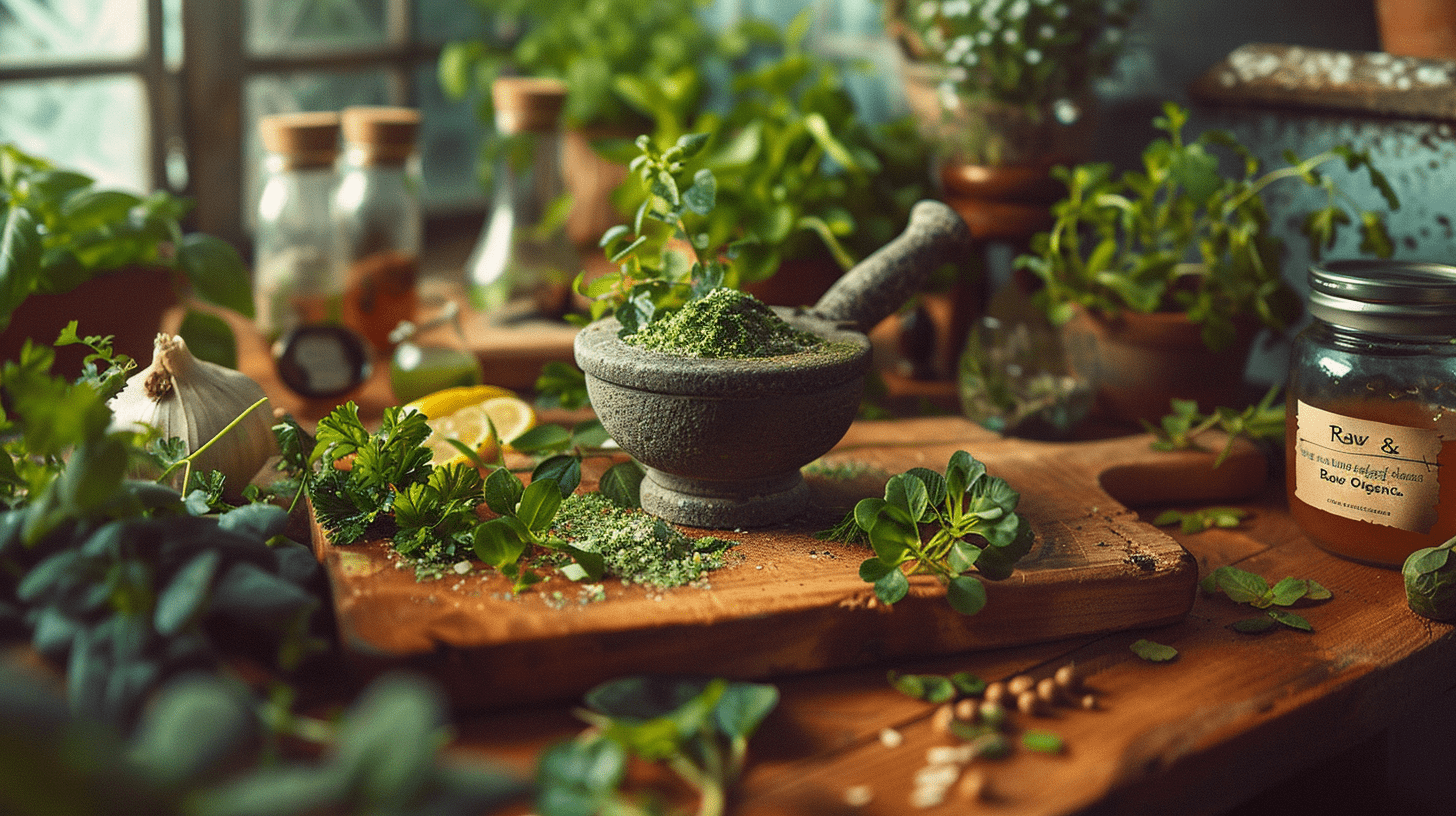
To boost your immune function, consuming nutrient-dense micro herbs like cilantro, basil, parsley, fenugreek, and amaranth can be beneficial. These plants contain a wealth of vital micronutrients, protective compounds, and fundamental elements for health.
Scientific studies have shown that it possesses antimicrobial, anti-inflammatory, and immunomodulatory properties.
Cilantro (Coriandrum sativum)
Cilantro contributes to increased immune function through its rich content of vitamins A, C, and E, as well as antioxidants.
How It Helps:
- Contains: Essential micronutrients such as vitamins A, C, and E, plus free radical-fighting substances.
- Benefits: Cilantro helps boost the immune system by reducing oxidative stress and inflammation.
Scientific Evidence:
Study: Research published in the Journal of Food Science and Technology highlights cilantro’s high antioxidant content, which can enhance immune defense by neutralizing free radicals (Ramadan, 2012).
Basil (Ocimum basilicum)
How It Helps:
- Contains: Essential oils, flavonoids, and vitamins A and C.
- Benefits: The herb basil possesses compounds that combat microbes and reduce inflammation, potentially enhancing the body’s defense mechanisms and helping ward off various pathogens.
Scientific Evidence:
Study: A study in Pharmaceutical Biology found that basil’s essential oils and polyphenolic compounds exhibit significant antimicrobial activity, enhancing immune protection (Silva et al., 2015).
Parsley (Petroselinum crispum)
Parsley is an herb rich in essential nutrients like vitamins A, C, and K, as well as folate and iron. These components contribute to its ability to support immune function and reduce inflammation.
How It Helps:
- Contains: Vitamins A, C, and K, folate, and iron.
- Benefits: The herb parsley contains an abundance of nutrients and protective compounds that bolster the body’s defense systems and help alleviate inflammatory responses.
Scientific Evidence:
Study: According to research in Immunopharmacology and Immunotoxicology, parsley’s high vitamin C and flavonoid content help bolster the immune system by enhancing the production and function of white blood cells (Yousefi et al., 2012).
Fenugreek (Trigonella foenum-graecum)
Fenugreek supports the immune system by modulating inflammatory responses and improving metabolic health.
How It Helps:
- Contains: Saponins, fiber, and various vitamins and minerals.
- Benefits: Fenugreek supports the immune system by modulating inflammatory responses and improving overall metabolic health.
Scientific Evidence:
Study: A study published in Pharmaceutical Biology showed that fenugreek has immunomodulatory effects, enhancing both innate and adaptive immunity (Yadav et al., 2013).
Amaranth (Amaranthus spp.)
Amaranth, belonging to the Amaranthus spp., contributes to increased immune function through its rich content of vitamins A, C, and E.
How It Helps:
- Contains: Key nutrients including vitamins A, C, and E, along with compounds that combat oxidative stress.
- Benefits: Amaranth helps enhance immune function through its high antioxidant and nutrient content, which support overall immune health.
Scientific Evidence:
Study: Research in the Journal of Food Science found that amaranth contains bioactive compounds that enhance immune response and reduce oxidative stress (Caselato-Sousa, 2012).
Summary
Incorporating these microherbs into your diet can significantly enhance immune function. Each herb offers a unique combination of vitamins, minerals, and antioxidants that support various aspects of the immune system, helping to maintain overall health and prevent illness.
References
Ramadan, Mohamed Fawzy. “Nutritional Value, Functional Properties and Nutraceutical Applications of Black Cumin (Nigella Sativa L.): An Overview.” International Journal of Food Science & Technology, vol. 42, no. 10, Oct. 2007, pp. 1208–1218, https://doi.org/10.1111/j.1365-2621.2006.01417.x.
Araújo Silva, V., Pereira da Sousa, J., de Luna Freire Pessôa, H., Fernanda Ramos de Freitas, A., Douglas Melo Coutinho, H., Beuttenmuller Nogueira Alves, L., & Oliveira Lima, E. (2015). Ocimum basilicum: Antibacterial activity and association study with antibiotics against bacteria of clinical importance. Pharmaceutical Biology, 54(5), 863–867. https://doi.org/10.3109/13880209.2015.1088551.
Yousofi, A., Daneshmandi, S., Soleimani, N., Bagheri, K., & Karimi, M. H. (2012). Immunomodulatory effect of Parsley (Petroselinum crispum) essential oil on immune cells: mitogen-activated splenocytes and peritoneal macrophages. Immunopharmacology and Immunotoxicology, 34(2), 303–308. https://doi.org/10.3109/08923973.2011.603338.
Yadav, U. C. S., & Baquer, N. Z. (2013). Pharmacological effects of Trigonella foenum-graecum L. in health and disease. Pharmaceutical Biology, 52(2), 243–254. https://doi.org/10.3109/13880209.2013.826247.
Caselato-Sousa, Valéria Maria, and Jaime Amaya-Farfán. “State of Knowledge on Amaranth Grain: A Comprehensive Review.” Journal of Food Science, vol. 77, no. 4, Apr. 2012, pp. R93–R104, https://doi.org/10.1111/j.1750-3841.2012.02645.x.
Incorporating nutrient-dense micro herbs into your daily health routine can provide a natural boost to your energy levels, mental clarity, focus, and immune function.
A variety of potent micro herbs, including basil, cilantro, parsley, fenugreek, and chia seeds, contain a wealth of crucial nutrients and compounds that fight cellular damage. These components derived from nature may contribute to improving your overall wellness and energy levels.
By making small changes to include these potent micro herbs, you can experience a significant improvement in your energy and support your body’s natural processes.
Can These Micro Herbs Be Used in Cooking for Added Health Benefits?
Integrating these small but mighty herbs into your dishes can yield additional wellness perks. Their concentrated nutritional profiles offer vital vitamins and minerals that boost vitality, cognitive sharpness, and immune health. By enhancing your recipes with these herbs, you can support your overall health.
Are There Any Potential Side Effects or Interactions With Medications?
Before incorporating new herbs or supplements, it’s crucial to seek advice from a medical expert. They can offer tailored recommendations considering your unique health circumstances and current prescriptions. Prioritizing safety is essential when making changes to improve your health.
How Can These Micro Herbs Be Incorporated Into a Daily Routine?
To incorporate these micro herbs into your daily routine, consider adding basil, cilantro, parsley, fenugreek, and chia to meals, smoothies, or salads. Their nutrient profiles can boost energy, mental clarity, focus, and immune function effectively.
Are There Ways to Grow These Herbs at Home for Easy Access?
To grow micro herbs at home for easy access, utilize pots with good drainage, place them in a sunny spot, water regularly, and guarantee proper air circulation. This method allows you to cultivate nutrient-dense herbs conveniently for daily use.
Can These Micro Herbs Be Used in Combination With Other Supplements for Enhanced Effects?
To improve effects, combine micro herbs with other supplements strategically. Seek guidance from a healthcare professional for the best synergy. Experiment cautiously to observe potential interactions. Personalize your regimen for maximum benefits and monitor results closely.
INTERESTED IN MICROGREENS?
Join the community
Join more than 100,000 other health-conscious individuals and couples who visit our site and receive weekly emails from us to help them grow more microgreens to live healthier and longer lives.






